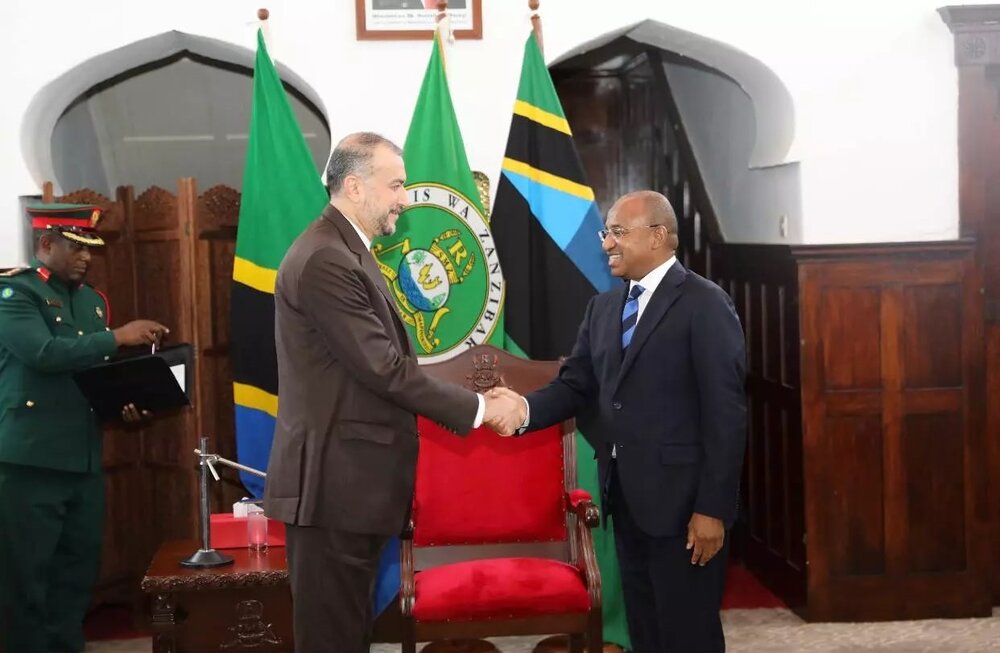Iran, Africa open new chapter in relations

TEHRAN – After holding several high-level meetings with African leaders, Iranian Foreign Minister Hossein Amir Abdollahian left Zanzibar for Tehran on Saturday.
The five-day tour of Africa included visits to Mali, Tanzania, and Zanzibar. Amir Abdollahian headed for the Republic of Mali at the head of a high-ranking political and economic delegation and arrived at the capital Bamako’s airport on Monday night, local time.
Iran’s relations with African countries have received a boost under President Ebrahim Raisi, who called for broadening Iran’s relations with non-Western countries. In addition to the Raisi administration, the Iranian Parliament paid attention to Africa as well.
In late May, Members of the Iranian parliament’s National Security and Foreign Policy Committee held a meeting with fifteen African ambassadors to Iran. The meeting was held on the occasion of Africa Day on May 25.
In this meeting, the Iranian lawmakers and African ambassadors discussed in detail the state of relations between Iran and Africa. Abbas Golrou, the chairman of the Iranian parliament’s National Security and Foreign Policy Committee who attended the meeting, said “the obstacles of Iran-Africa cooperation, priorities from the perspective of Africans, and strategies for developing cooperation were discussed” in the meeting.
The lawmakers expressed regret at the low level of trade between Iran and Africa. “The conditions of relations between Iran and African countries are not favorable, good and acceptable. One thousand billion dollars is the volume of African trade, while Iran's share is one-thousandth, i.e., less than one billion dollars, and this is not acceptable,” Golrou said.
The MP said, “All the ambassadors welcomed the development of Africa's economic relations with Iran and stressed the need for it, and expressed dissatisfaction with the lack of sufficient knowledge of each other's markets. They emphasized that the most important factor in the low level of communication is the lack of knowledge we have about each other.”
To further improve trade and economic cooperation, Amir Abdollahian took with him an economic delegation from both the public and private sectors. In Mali, the Iranian foreign minister, together with his Malian counterpart, attended a joint meeting of Iranian and Malian businesspeople. In this meeting, Amir Abdollahian underlined the need to expand interactions between business and trade activists of the two countries. He said the Iranian Foreign Ministry is ready to facilitate contacts and cooperation between the private sectors of Iran and Mali.
Also, the foreign ministers of Iran and Mali signed a memorandum of understanding for the first joint commission for comprehensive cooperation. During Amir Abdollahian’s stint in Mali, the first meeting of the Joint Commission on Cooperation between Iran and Mali was held and it was decided to hold the next meeting in Tehran.
In Tanzania, Amir Abdollahian pursued a similar goal. He attended a meeting of the Iran-Tanzania Business Forum. In this meeting, Amir Abdollahian highlighted the economic, industrial and technological capacities of the Islamic Republic of Iran.
He said the enhancement of economic ties with African countries, especially Tanzania, is a priority of Iran’s foreign policy.
In a meeting with Iranian nationals and representatives of Iranian organizations in Tanzania, Amir Abdollahian announced the creation of a roadmap to expand ties in all spheres with Tanzania and efforts to remove hurdles to economic interactions between Iranians and the African country.
Under President Raisi, the development of relations with Africa became a pillar of Iran’s foreign policy. In a late May phone call with the Senegalese president, Iranian President Ayatollah Seyed Ebrahim Raisi called attention to the African continent as one of the main axes of Iran's foreign policy and added, “Iran is a reliable partner for African countries.”
Leave a Comment